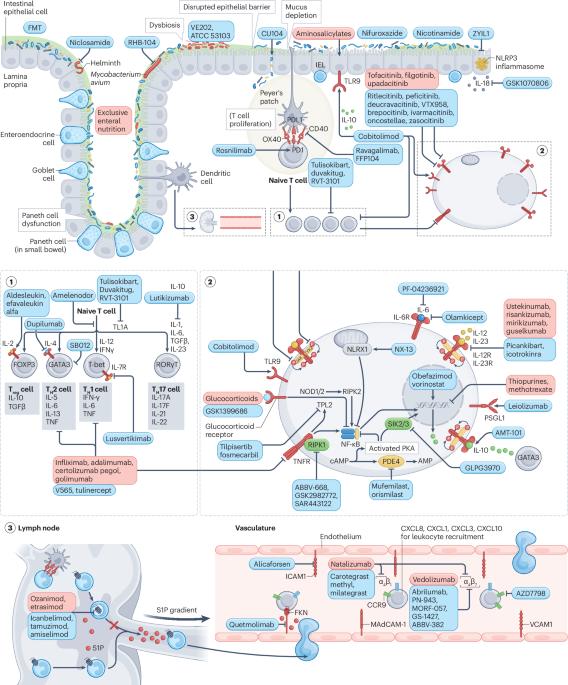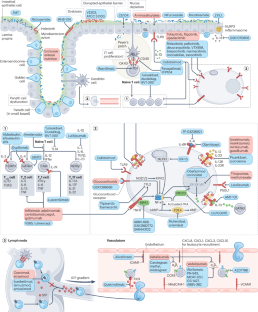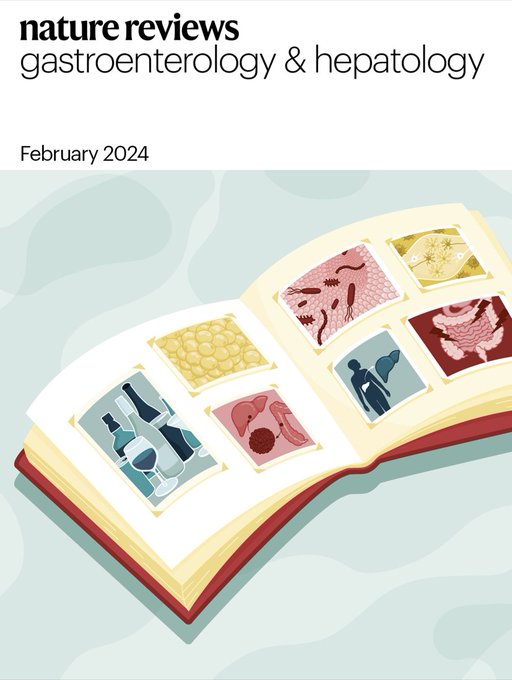Understanding the therapeutic toolkit for inflammatory bowel disease
IF 51
1区 医学
Q1 GASTROENTEROLOGY & HEPATOLOGY
引用次数: 0
Abstract
Inflammatory bowel disease (IBD), encompassing ulcerative colitis and Crohn’s disease, is a group of chronic, immune-mediated disorders of the gastrointestinal tract that present substantial clinical challenges owing to their complex pathophysiology and tendency to relapse. A treat-to-target approach is recommended, involving iterative treatment adjustments to achieve clinical response, reduce inflammatory markers and achieve long-term goals such as mucosal healing. Lifelong medication is often necessary to manage the disease, maintain remission and prevent complications. The therapeutic landscape for IBD has evolved substantially; however, a ceiling on therapeutic efficacy remains and surgery is sometimes required (owing to uncontrolled disease activity or complications). Effective IBD management involves comprehensive care, including medication adherence and a collaborative clinician–patient relationship. This Review discusses current therapeutic options for IBD, detailing mechanisms of action, efficacy, safety profiles and guidelines for use of each drug class. We also explore emerging therapies and the role of surgery. Additionally, the importance of a multidisciplinary team and personalized care in managing IBD is emphasized, advocating for patient empowerment and involvement in treatment decisions. By synthesizing current knowledge and emerging trends, this Review aims to equip healthcare professionals with a thorough understanding of therapeutic options for IBD, enhancing informed, evidence-based decisions in clinical practice. The management of inflammatory bowel disease (IBD) continues to evolve. This Review is a practical guide on the therapeutic toolkit for IBD, with a focus on current and emerging IBD medications, how they relate to management strategies beyond drugs and the importance of the clinician–patient relationship.


了解炎症性肠病的治疗方法
炎症性肠病(IBD),包括溃疡性结肠炎和克罗恩病,是一组慢性、免疫介导的胃肠道疾病,由于其复杂的病理生理和复发倾向,目前具有重大的临床挑战。建议采用从治疗到目标的方法,包括反复调整治疗以达到临床反应,减少炎症标志物并实现黏膜愈合等长期目标。为了控制疾病、维持缓解和预防并发症,通常需要终生服药。IBD的治疗前景已经发生了很大的变化;然而,治疗效果仍然存在上限,有时需要手术(由于疾病活动不受控制或并发症)。有效的IBD管理包括全面的护理,包括药物依从性和合作的医患关系。本综述讨论了目前IBD的治疗方案,详细介绍了每种药物的作用机制、疗效、安全性概况和使用指南。我们还探讨了新兴疗法和手术的作用。此外,强调了多学科团队和个性化护理在IBD管理中的重要性,倡导患者赋权和参与治疗决策。通过综合当前的知识和新兴趋势,本综述旨在使医疗保健专业人员全面了解IBD的治疗选择,加强临床实践中的知情、循证决策。
本文章由计算机程序翻译,如有差异,请以英文原文为准。
求助全文
约1分钟内获得全文
求助全文
来源期刊
CiteScore
52.30
自引率
0.60%
发文量
147
审稿时长
6-12 weeks
期刊介绍:
Nature Reviews Gastroenterology & Hepatology aims to serve as the leading resource for Reviews and commentaries within the scientific and medical communities it caters to. The journal strives to maintain authority, accessibility, and clarity in its published articles, which are complemented by easily understandable figures, tables, and other display items. Dedicated to providing exceptional service to authors, referees, and readers, the editorial team works diligently to maximize the usefulness and impact of each publication.
The journal encompasses a wide range of content types, including Research Highlights, News & Views, Comments, Reviews, Perspectives, and Consensus Statements, all pertinent to gastroenterologists and hepatologists. With its broad scope, Nature Reviews Gastroenterology & Hepatology ensures that its articles reach a diverse audience, aiming for the widest possible dissemination of valuable information.
Nature Reviews Gastroenterology & Hepatology is part of the Nature Reviews portfolio of journals.

 求助内容:
求助内容: 应助结果提醒方式:
应助结果提醒方式:


